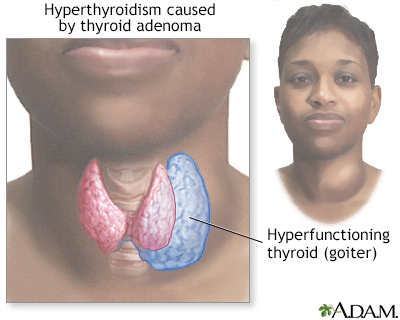Hyperthyroidism

What is hyperthyroidism?
Hyperthyroidism is a condition in which the thyroid gland produces too much thyroid hormone, leading to a range of symptoms, including weight loss, fatigue, and rapid heartbeat.
Who's at risk for hyperthyroidism?
Hyperthyroidism can affect people of all ages, but it is more common in women and people over the age of 60. Other risk factors for hyperthyroidism may include:
- Family history of thyroid disease
- Previous thyroid surgery or radiation treatment
- Autoimmune disorders, such as Graves' disease or Hashimoto's thyroiditis
- Certain medications, such as amiodarone or interferon
What causes hyperthyroidism?
Hyperthyroidism is caused by an overactive thyroid gland that produces too much thyroid hormone. This can be caused by a variety of factors, including autoimmune disorders, thyroid nodules or goiters, or medications that affect thyroid function.
How does hyperthyroidism start?
Hyperthyroidism may start gradually or suddenly, depending on the underlying cause. Some people may develop symptoms gradually over time, while others may experience a sudden onset of symptoms.
What are the symptoms of hyperthyroidism?
The symptoms of hyperthyroidism may include:
- Rapid heartbeat or palpitations
- Weight loss or difficulty gaining weight
- Fatigue or weakness
- Nervousness or anxiety
- Tremors or shaking
- Heat intolerance or increased sweating
- Changes in menstrual patterns
- Increased appetite
- Goiter (enlarged thyroid gland)
- Eye problems, such as bulging or irritation (in cases of Graves' disease)
How is hyperthyroidism diagnosed?
Diagnosing hyperthyroidism typically involves a physical examination and a review of the person's medical history and symptoms. Blood tests may also be done to measure levels of thyroid hormones and thyroid-stimulating hormone (TSH).
How can hyperthyroidism be treated?
Treatment for hyperthyroidism typically involves managing symptoms and correcting the underlying cause of the condition. This may involve medications to help regulate thyroid hormone levels, radioactive iodine therapy to reduce thyroid gland activity, or surgery to remove the thyroid gland in severe cases.
What complications may occur with hyperthyroidism?
Complications of hyperthyroidism may include:
- Heart problems, such as arrhythmias or heart failure
- Bone loss or osteoporosis
- Thyroid storm (a rare, life-threatening complication of untreated hyperthyroidism)
- Eye problems, such as double vision or loss of vision (in cases of Graves' disease)
How can I prevent hyperthyroidism?
There is no known way to prevent hyperthyroidism, as it is often caused by underlying health conditions or genetic factors. However, avoiding exposure to radiation and certain medications may help reduce the risk of developing the condition.
Long-term management of hyperthyroidism
People with hyperthyroidism may require ongoing medical care and monitoring to manage their condition and prevent complications. This may involve regular check-ups with a healthcare provider, as well as following recommended screening guidelines for bone density and heart health.
What is recent research saying about hyperthyroidism?
Recent research in hyperthyroidism has focused on improving understanding of the genetic and environmental factors that contribute to the condition, as well as developing new treatments and therapies to manage symptoms and prevent complications. Some of the promising areas of research include:
- Identification of new genetic markers that may help predict the risk of developing hyperthyroidism
- Development of new medications and therapies that target specific pathways involved in thyroid hormone production and regulation
- Investigation of the impact of diet and lifestyle factors on the progression and management of hyperthyroidism
Where can I go for more information on hyperthyroidism?
If you or someone you know has hyperthyroidism or wants more information on the condition, it is important to seek help from a healthcare provider who specializes in the treatment of thyroid disorders. The following organizations also provide information and resources on hyperthyroidism:

